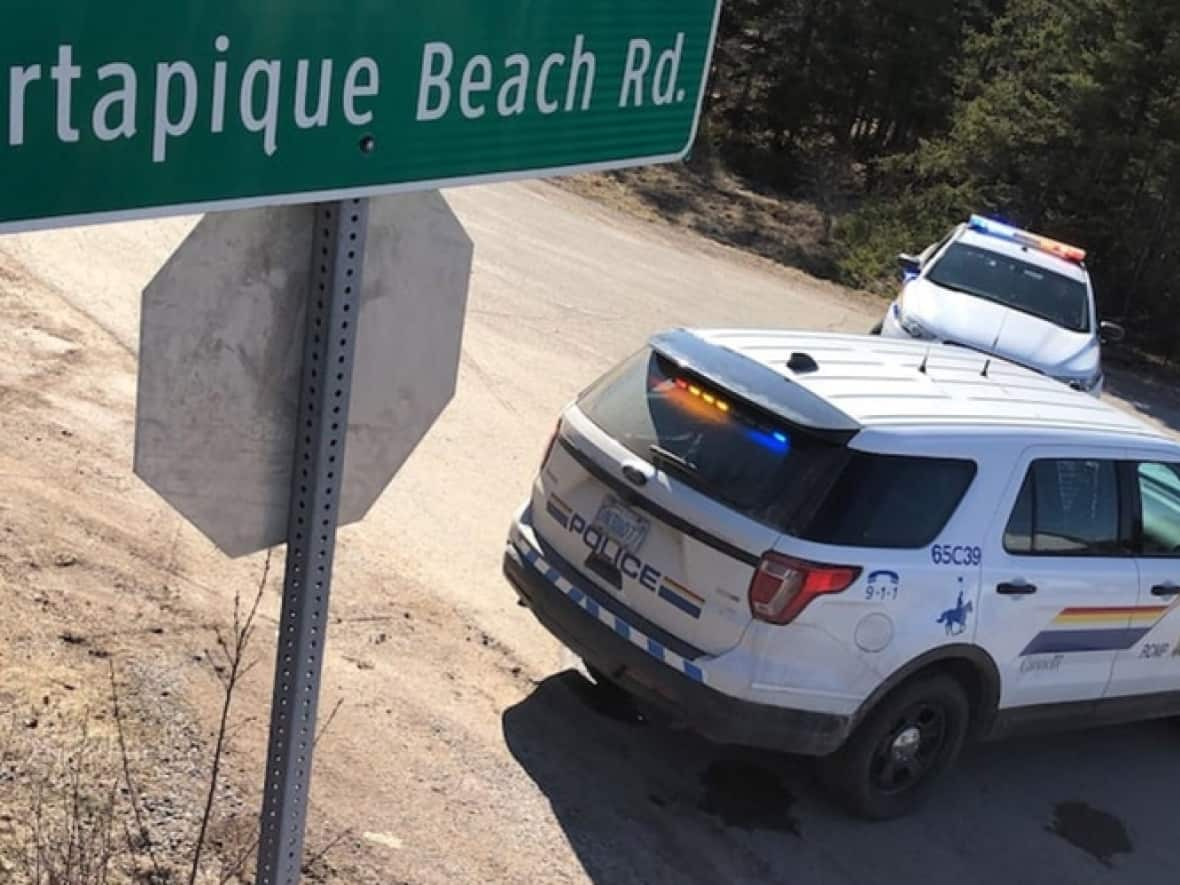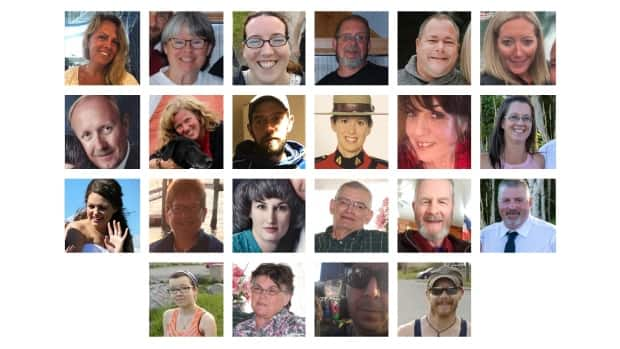N.S. mass shooter was treated 'like an animal' by his father, family says

Warning: This story contains disturbing details
New details describe how the gunman who killed 22 people in the Nova Scotia massacre of April 2020 was raised in a home of violence and psychological torment, growing up to continue the pattern set by a father he hated.
The Mass Casualty Commission leading the inquiry into what happened on April 18-19, 2020, when Gabriel Wortman went on a deadly rampage across the province in a mock RCMP car, released new documents Monday on the violence in Wortman's family.
Police interviews with various members of Wortman's family, as well as his common-law spouse Lisa Banfield, describe how the gunman was abused for years by his father, Paul Wortman.
"He never treated him like a little boy. He treated him like an animal," Glynn Wortman, Paul's brother, said in a police interview shortly after the massacre.
Laura Snowdon, commission counsel, said Monday that details of the gunman's upbringing were not intended to create sympathy for him, or "excuse or explain the horrific acts that he went on to commit."
"There are many people who witness or experience violence and abuse as children who do not go on to perpetrate mass casualty events," Snowdon said.
Instead, she said the topic was important when considering the broader causes and context that gave rise to the rampage.
Gabriel grew up as an only child in the Moncton, N.B., area with parents Paul and Evelyn Wortman. He has one sibling, biological brother Jeff Samuelson, who Paul and Evelyn had in 1970 in the U.S. and placed up for adoption at birth.
Samuelson eventually learned of his birth family and met his parents, and the gunman, in 2010.
According to the foundational document released on Monday, the commission has not yet interviewed members of the Wortman family through its own team, despite attempts to speak to some of them.
History of violence in Wortman family
Inquiry documents said Paul has four brothers: Neil, Glynn, Alan and Chris. The two youngest brothers, Alan and Chris, are retired RCMP members.
In his statement to the RCMP after the mass shooting, Paul said he had been raised in a violent family "[w]here there was more than screaming going on."
Alan Wortman confirmed this in an interview with police, and said their father, Stanley — the gunman's grandfather —was violent toward the three older brothers, but not their mother, himself or Chris.
In a letter to Samuelson after he learned of his birth family, Neil outlined the Wortman family history and how violence went back two generations to the gunman's great-grandfather, George Wortman.
He wrote that George was "a tyrant who brutalized his family," and his children, including Stanley, were "seriously off-centre."
"All of them, to varying extents, treated their wives and children the only way they knew how — like their father treated his family members. Abused children often become abused parents," Neil said.
Paul Wortman's brothers also described several incidents of abuse against his wife Evelyn, and said Gabriel witnessed much of it. One brother said they never reported the abuse because they were all "terrified" of Paul.
Childhood incidents
The gunman's childhood, and Paul himself, were keys to understanding the entire rampage, Glynn told police, adding Gabriel was "warped."
There were various incidents that left a mark on the gunman, Banfield and others said, including one time when Paul drove his son alone down a dirt road and Gabriel was convinced his father was going to kill him.
Another time, Paul gave his son a gun and told him to shoot him.
In his interview with the RCMP, Paul said he "had a hell of a temper" and screamed a lot but "I never hit Gabriel."

Samuelson said Paul once told him a story about how when Gabriel was about two and a half, Paul decided that Gabriel didn't need his favourite blanket anymore "so he burnt the friggen thing in front of him."
Banfield and Neil told police that when the gunman was younger than 10, Paul made him kill the family dog.
"What does that do to a kid?" Neil said.
During the rampage in April 2020, the gunman also shot several dogs.
Banfield has said the gunman told her he didn't feel his mother protected him from the abuse. As a result, Banfield said the gunman "had no respect for women, no respect for his father."
Gunman's violence toward father
The gunman grew up and went to the University of New Brunswick, studying psychology. That's where he met his first wife, and would go on to become a funeral director and later set up a denturist practice in the Halifax area.
On a family trip to Cuba around 2000, the gunman assaulted his father, Paul, who said Gabriel beat him until he was unconscious.
Banfield, who was also on the trip, said the fight began because Paul was denying how he'd treated the gunman as a child.
After the assault, Paul took Banfield aside and urged her to leave the gunman.
He told her, "I was a bastard to my wife, I was a bastard to my son and Gabriel's gonna do the same thing to you," Banfield recalled to police.
Threats uttered against parents
There was another incident in June 2010 when the gunman phoned Glynn and told him he was going to drive to his parents' house in New Brunswick to kill them.
Paul spoke to a Halifax Regional Police officer at the time who was investigating the allegation, and said his son had several serious weapons including pistols and long-barrelled guns, without a licence.
But Paul hadn't seen them himself in more than five years, and without more information the officer believed he couldn't get a search warrant.
When talking to police after the mass shooting, Paul said the massacre might have been avoided if "somebody had done a little bit more pushing" around the threats.
Gunman's medical history
According to medical records, the gunman was referred to psychiatrist Dr. Douglas Maynes in 2000.
The gunman saw Maynes four times. For these visits, the term listed under his chart is "narcissistic personality."
He also saw Dr. Cynthia Forbes in Fall River for hypertension in 2009 and reported a "history of alcoholism," although the notes state he planned to stop drinking that coming summer.
At that time, Forbes suggested the gunman see a psychologist to help him deal with stress "but he wasn't interested at this point."
He didn't return to Forbes until June 2018, and between that time and January 2020 he visited her seven times for treatment of "benign hypertension."
"He had a horrible upbringing from a very dysfunctional family. And, um, never sought help … and … fell through the cracks," Chris said.
Chris also told police he always knew the gunman was capable of killing someone, most likely his parents or Banfield, "but not to this extent."
'This could have been me'
Samuelson said when he connected with his birth family in 2010, the revelation of having a long-lost brother came as a "major bombshell" for Gabriel.
The gunman had to go through a "horrendous upbringing" alone with no role models, Samuelson said.
Chris agreed with this point, telling police he believes a lot of the animosity between the gunman and his parents stemmed from them keeping his brother a secret.
"This could have been me up there if ah, you know, if I had grew up in an environment like Gabriel did," Samuelson said.
On Monday, the inquiry is also expected to hear from a witness panel on mass shootings and masculinity, and an expert on intimate partner and family violence.
MORE TOP STORIES


